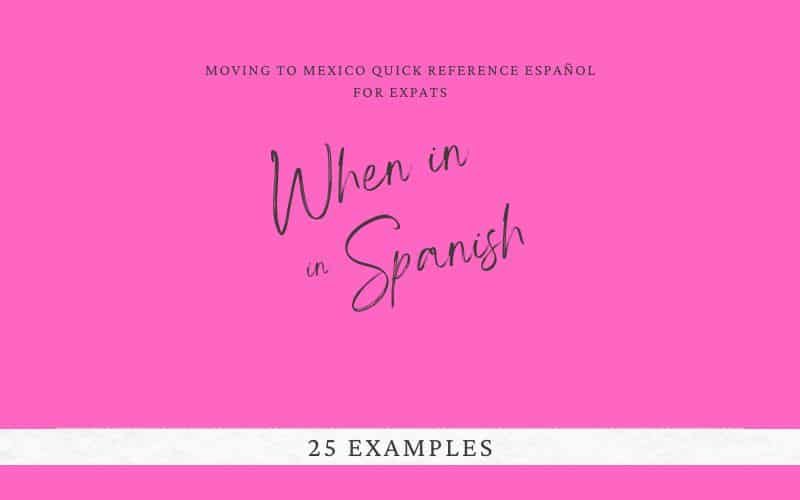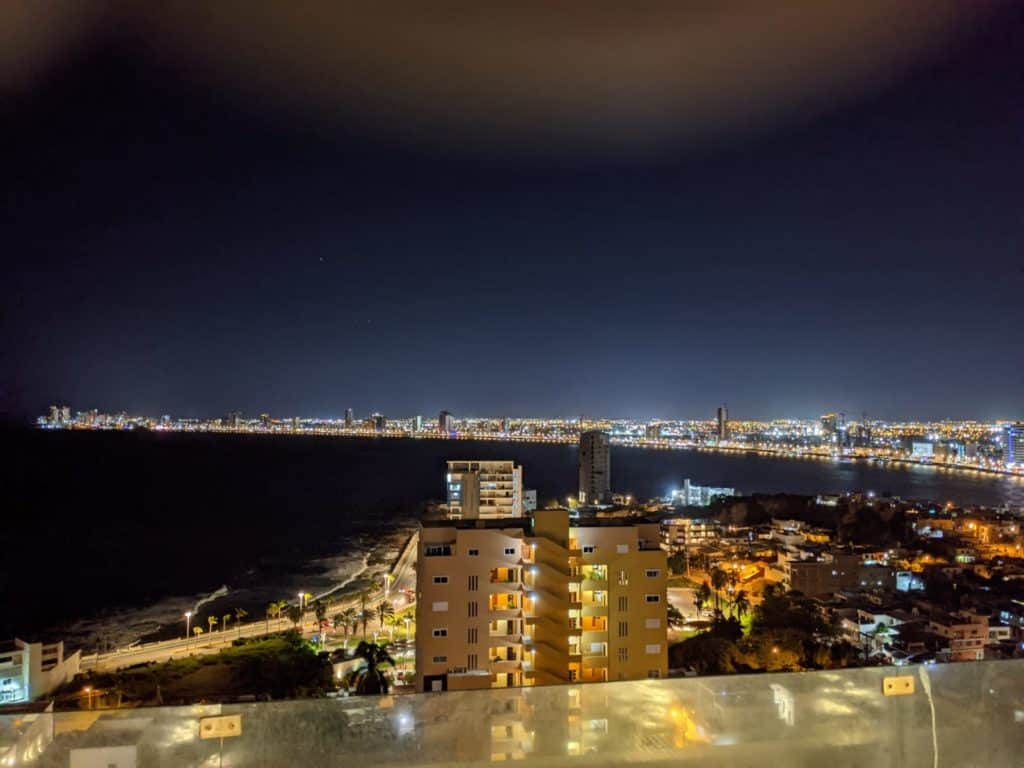When in Spanish Translation
The Spanish translation of “when” is “cuando” (pronounced: kwán-do). “Cuando” can be used in all tenses, including present, past, and future, to indicate the time at which an event or action occurs.
For example: “¿Cuándo empieza la clase?” (When does the class start?), “Cuando lo vi por última vez, estaba muy feliz” (When I saw him last, he was very happy), and “Mañana, cuando amanezca, iremos al parque” (Tomorrow at dawn, we will go to the park).
Why Cuando is important in your Move to Mexico
If you’re moving to a Spanish-speaking country like Mexico, having a basic understanding of the Spanish language is essential. This is particularly true for the word “when,” which is an important aspect of daily communication. In this blog post, we’ll be discussing the Spanish translation of “when” and how to use it in different situations. The Spanish word for “when” is “cuando” (pronounced: kwán-do).
This post “When in Spanish Translation” is part of the “Moving to Mexico Quick Reference Español for Expats” series, designed to provide practical and useful information for those making the move to Mexico or any Spanish-speaking country.

When to use When in Spanish

As a traveler to a Spanish-speaking country, having a basic understanding of the Spanish language can greatly enhance your experience. One of the most important words to know is “cuando,” which translates to “when” in English. This word is useful in a variety of situations and can help you communicate more effectively with the locals.
For example, you can use “cuando” to ask about the schedule or timing of events or activities. For instance, if you’re planning on visiting a museum, you can ask “¿Cuándo abre el museo?” (When does the museum open?). Or if you’re trying to coordinate plans with friends, you can ask “¿Cuándo te gustaría salir esta noche?” (When would you like to go out tonight?).
In addition to asking about schedules, you can also use “cuando” to ask about the duration of events. For example, if you’re going on a tour, you can ask “¿Cuánto tiempo dura la visita guiada?” (How long does the guided tour last?).
Knowing how to use “cuando” will not only help you plan your travels more effectively, but it will also demonstrate to the locals that you are making an effort to communicate with them in their language. So, don’t hesitate to use this word when traveling to a Spanish-speaking country!
When in Spanish – 25 Examples
| English | Spanish Translation |
|---|---|
| When | Cuando |
| When will the meeting start? | ¿Cuándo empezará la reunión? |
| When do you arrive in Mexico? | ¿Cuándo llegas a Mexico? |
| When do the stores close on weekends? | ¿Cuándo cierran las tiendas los fines de semana? |
| When is your birthday? | ¿Cuándo es tu cumpleaños? |
| When do you want to go for lunch? | ¿Cuándo quieres ir a almorzar? |
| When is the concert taking place? | ¿Cuándo tendrá lugar el concierto? |
| When did you first learn Spanish? | ¿Cuándo aprendiste español por primera vez? |
| When do classes start this semester? | ¿Cuándo empiezan las clases este semestre? |
| When will we see each other again? | ¿Cuándo nos veremos de nuevo? |
| When do the results of the exam come out? | ¿Cuándo saldrán los resultados del examen? |
| When is the next flight to Mexico? | ¿Cuándo es el próximo vuelo a México? |
| When do we need to be at the airport? | ¿Cuándo tenemos que estar en el aeropuerto? |
| When did you start your current job? | ¿Cuándo comenzaste tu trabajo actual? |
| When is the next bus to Guadalajara? | ¿Cuándo es el próximo bus a Guadalajara? |
| When will the new movie be released? | ¿Cuándo se lanzará la nueva película? |
| When do you plan to retire? | ¿Cuándo planeas jubilarte? |
| When is your next day off? | ¿Cuándo es tu próximo día libre? |
| When did you last see him? | ¿Cuándo lo viste por última vez? |
| When is the best time to visit Mazatlan? | ¿Cuándo es el mejor momento para visitar Mazatlán? |
| When will the museum be open tomorrow? | ¿Cuándo estará abierto el museo mañana? |
| When do you plan to go to the beach? | ¿Cuándo planeas ir a la playa? |
| When do we need to submit the project? | ¿Cuándo tenemos que entregar el proyecto? |
| When is the next soccer match? | ¿Cuándo es el próximo partido de fútbol? |
| When did you last travel to another country? | ¿Cuándo viajaste por última vez a otro país? |
| When will you be back home? | ¿Cuándo volverás a casa? |
The Importance of Knowing “When” in Spanish Translation
By now, you should have a pretty good handle on how to use “cuando” in Spanish, and in what situations it can be particularly useful. Whether you’re a tourist, long-term resident, or snowbird, understanding the basics of this key word will help you communicate more effectively with us locals and make the most of your time here in Mexico.

If you can master the basics, you’ll be amazed at how much you can accomplish when it comes to learning Spanish. When you’ve got the basics down, you’ll have a much easier time picking up new vocabulary and grammar.
Want to improve your Spanish? Check out our Top Online Spanish Courses for 2023!
And remember, when in doubt, just ask “¿Cuándo?” It’s a question that can come in handy in all sorts of situations, and it’ll show the locals that you’re making an effort to communicate with them in their language. So, don’t be shy, give it a try ????
In conclusion, whether you’re planning a trip, setting up a new life, or just looking to have a good time, knowing “when” in Spanish can make all the difference. So, start practicing your “cuando” today, and you’ll be well on your way to becoming a Spanish-speaking pro in no time!
Remember…..

FAQs – Learn Spanish Faster!
The word “when” in Spanish is “cuando”. This word is used to indicate the time at which an event will occur. For example, “Cuando llegues a México, me avisas” which translates to “When you arrive in Mexico, let me know.”
“Cuando” is a versatile word in Spanish and can be used in a variety of contexts. It can be used to ask questions, such as “Cuándo es tu cumpleaños?” which translates to “When is your birthday?” It can also be used in statements, such as “Cuando llegue a casa, comeremos” which translates to “When I get home, we’ll eat.”
The correct spelling of the Spanish word for “when” is “cuando”. While “quando” is sometimes used, it is not a commonly accepted spelling.
The word “luego” can be translated to “then” in English, but it can also mean “later”. In Spanish, “luego” is used to indicate that something will occur at a later time. For example, “Luego hablamos” which translates to “We’ll talk later.”
“Cuántos” is the Spanish word for “how many”. This word is used to ask questions about quantity, such as “Cuántos amigos tienes?” which translates to “How many friends do you have?”
Ready to Practice Your Spanish Live? Here’s a few Places to Stay in Mazatlan….









